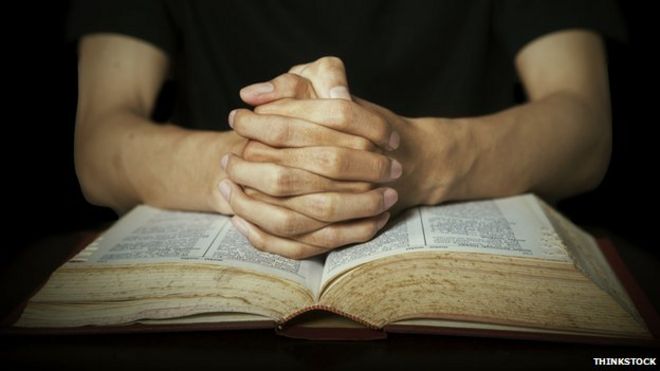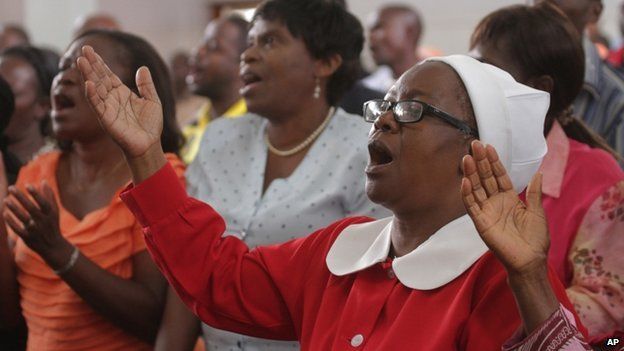Are we losing our religion? The answer for the UK seems to be « Yes », while the answer for the developing world is a resounding « No ».
That was the conclusion of a recent analysis by the Pew Research Center in the US.
 It suggests that in the UK, if current trends continue, the proportion of the population identifying themselves as Christians will fall from 64% in 2010 to 45% by 2050, while the proportion of Muslims will rise from 5% to 11%.
It suggests that in the UK, if current trends continue, the proportion of the population identifying themselves as Christians will fall from 64% in 2010 to 45% by 2050, while the proportion of Muslims will rise from 5% to 11%.
The proportion of the population claiming no religion in the UK – the « unaffiliated » – will also rise significantly, from 28% to 39%.
Pew’s research also suggests there are likely to be more Muslims than Christians in the world by 2070, with Islam’s share of global population equalling that of Christianity at just above 30% each by 2050.
Equally eye-catching is its conclusion that by 2050, under half of the population will be Christian not just in the UK, but also France, the Netherlands, Bosnia-Herzegovina, Australia and New Zealand, while Muslims will make up about 10% of Europe’s population, up from 6% now, thanks to higher birth rates.
However, Christianity globally will continue to grow, with the number of Christians projected to rise significantly in sub-Saharan Africa in particular.
According to demographer Conrad Hackett at Pew, in 1910 some 66% of the world’s Christians lived in Europe. Now that has fallen to about 25%.
By 2050, however, Europe will be home to just 16% of the world’s Christians, while four out of every 10 Christians globally will live in sub-Saharan Africa, thanks to high birth rates and falling infant mortality.
Huge transformation
So what does that mean for the UK?
 « We are living through the biggest religious transition since the Reformation of the 16th Century, » says Linda Woodhead, professor of the sociology of religion at Lancaster University.
« We are living through the biggest religious transition since the Reformation of the 16th Century, » says Linda Woodhead, professor of the sociology of religion at Lancaster University.
« [Prime Minister] David Cameron may have said at Easter that ‘we are still a Christian country’, but for how much longer? »
For Mr Hackett, the idea religion will fade as developing countries become more economically successful and better educated « is often tied in to the secularism debate ».
But, he says, while there is evidence of that in some societies, in others « there is no evidence that people are shedding their religious identity, even as their societies become wealthier ».
« In China, for example, people are more and more claiming some religious identity, and we have no clear evidence that as these countries develop, they will follow the patterns we see in Western Europe, » he says.
Religions in the UK:
- Christians: 2010: 64%, 2050: 45%
- Muslims: 2010: 5%, 2050: 11%
- Hindus: 2010: 1.4%, 2050: 2%
- Jews: 2010: 0.5%, 2050: 0.3%
- Buddhists: 2010: 0.4%, 2050: 0.9%
- Folk religions: 2010: 0.1%, 2050: 0.3%
- No religion: 2010: 28%, 2050: 39%
Source: Pew Research Center
According to Ms Woodhead, that means that contrary to long-held Western assumptions that religion would disappear as societies developed, secular and religious liberalism itself will become the exception in the world and not the norm.
« Western governments will have to work hard to convince the world of the value of liberal democracy and the forms of religion and belief which have supported it, and I am not sure they yet grasp the scale of the challenge, » she says.
But why should the UK in particular be losing the Christian roots that have so profoundly shaped its history, culture and even its welfare state?
Inward-looking
 « The Church of England and the Church of Scotland are in collapse, » says Ms Woodhead.
« The Church of England and the Church of Scotland are in collapse, » says Ms Woodhead.
« The Church lost touch with our everyday life and has become inward-looking rather than being a broad Church for the whole of society.
« The Churches of England and Scotland have failed to win the hearts and minds of the young for several generations now, while numbers for the Catholic Church are really only holding up thanks to immigration. »
She believes there is the danger of a future in Britain in which those with no religious affiliation and the faithful « won’t understand each other », with the religious of all faiths potentially moving more towards the extremes, with the risk of cultural segregation.
« Religions have a natural dynamic towards more sectarian fundamentalist extremes, and we are losing the moderating forces internally and externally that used to regulate and deal with these tendencies, including Parliamentary interest and involvement, » she says.
Adjustment ‘needed’
However, Grace Davie, professor emeritus in sociology at the University of Exeter and author of the new book Religion in Britain: A Persistent Paradox, has a slightly different take.
« This is an adjustment of Christendom, rather than an Anglican issue, » she says.
« We hear a lot of debate saying that the Anglican Church has failed.
« But it’s only facing the same challenges as the Catholic Churches and the Scandinavian Churches in Europe.
« Anglicans tend to beat themselves up about it as if it’s their fault. It’s not, » she says.
« It’s an adjustment they all have to make, but it’s at a particularly acute stage for the Anglicans.
« Looking at the figures, there are the committed religious people, the committed secular people, and in the middle, there’s this grey area.
« The pendulum is swinging gradually towards the secular end, while everyone is wondering what the growth in Islam will mean.
« In the UK, we are all adjusting to greater diversity. »
Prof Davie points out that the figures indicate Christians will still be the biggest single faith group in the UK by 2050.
« There’s no room for complacency, but there will be a future for Christianity, » she says.
« It will just be a different future.
« It will be smaller and more committed, but not necessarily more extreme.
« It’s a gradual shift in the model, which brings with it more pressure to choose.
« But you have to be very cautious about predictions.
« In the 1960s, many thought the world would become more secular, and that hasn’t happened.
« Europe is so distinctive from the rest of the world, and that is to be pondered – bearing in mind that it’s a tiny and shrinking bit of the world. »
New spirituality
Yet in an age when Christianity appears to be dwindling in the UK, what – if anything – will take its place, or attempt to offer meaning to those of no faith?
Is it art or science, poetry or football, or humanism – or new forms of spirituality, or simply seeking contentment in family and friends?
That increasing lack of belief is not confined to religion alone, but appears to be affecting almost every other sphere of authority – while new technology allows individuals to access more knowledge than ever before about the world around us, while apparently leaving us no happier.
Faith in politicians, government, the mainstream media and in many other institutions has diminished, yet the human search for meaning, identity and principles that unite us as a society has not gone away.
BBC News